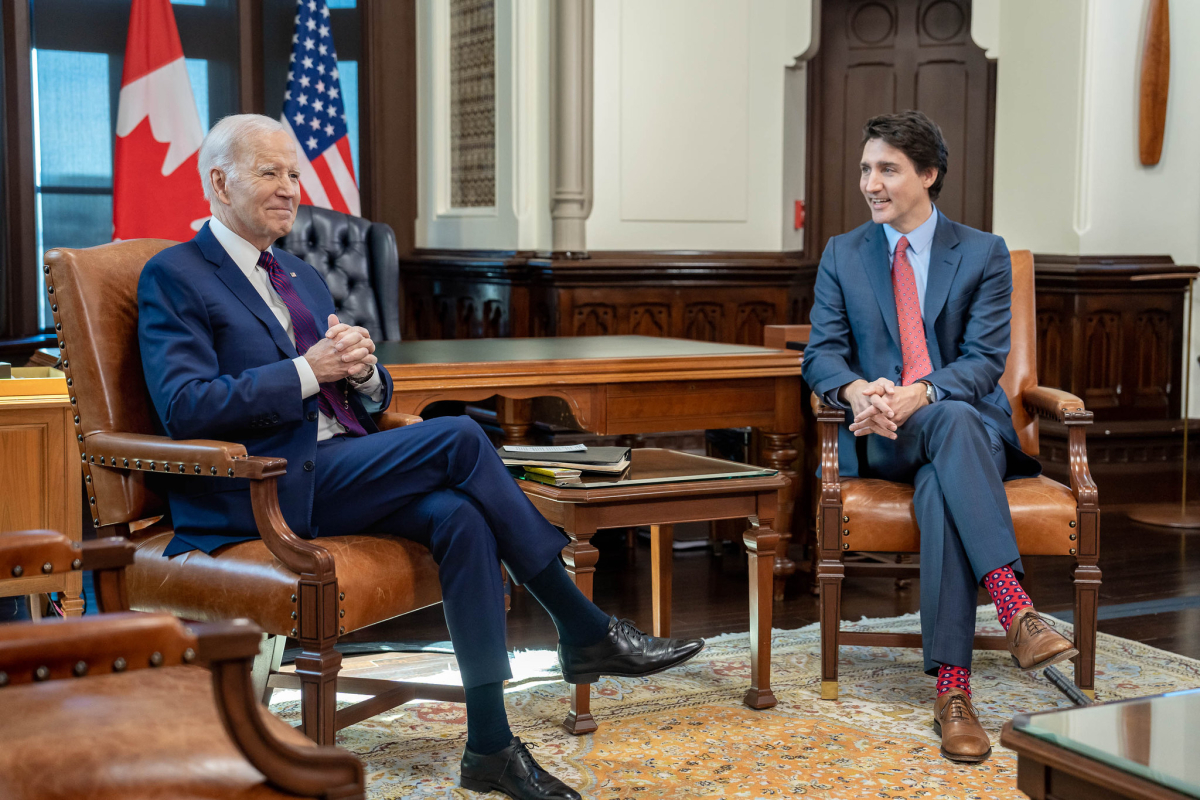Support strong Canadian climate journalism for 2025
It’s a tough time to be an incumbent, regardless of whether you’re ideologically left, right, or centre.
In the United Kingdom, Rishi Sunak’s Conservative government went down hard against the Labour Party. In France, president Macron’s legislative snap-election gambit is set to fail, with the far-right’s massive projected gains stymied only by an 11th-hour effort across parties to coordinate against them. In Germany, prime minister Olaf Scholz is unpopular and facing his own reckoning as his government crumbles.
In the United States, president Biden is slumping in post-debate polls. He was already facing a tough rematch against Donald Trump before his disastrous performance on stage.
In Australia, prime minister Anthony Albanese’s popularity hit a low this month, with half of the country disapproving of his job performance. Nine months ago, in New Zealand voters returned a National Party government as the country’s Labour party lost its parliamentary majority and then some.
At home, prime minister Trudeau and the Liberals have been trailing Pierre Poilievre’s Conservative Party for a long time. The Tories have opened a consistent double-digit lead, in some polls exceeding 20 points. The Liberals are set to lose the next federal election, which is scheduled for the fall of 2025.
What’s happening in these advanced democracies gives us a hint about what might be a broader phenomenon playing out right now: a backlash against incumbents that cuts across the political spectrum — parties of all stripes that have been in power over the past several years are, across the global North, being shown the door.
It’s wrong to think that voters are inherently ideological or partisan. Some are one or the other. Some are both. Profiles vary country by country. But, as a rule, most people aren’t little political machines walking around with entrenched and consistent ideological political commitments.
But in a shared society, people experience — and respond to — the same forces. That includes getting angry and frustrated and keen to throw the bums out, whatever their ideological disposition, when things get tough. Because people want solutions to their problems.
The last year, or perhaps few years, suggests that voters in a host of similar democracies are dissatisfied with the status quo, with the resulting split in support forming less along right-left lines than incumbent-challenger. And while each country has its own history, dynamics, issues, personalities, and quirks, each shares certain challenges, too.
Monocausal explanations for complex outcomes tend to be lazy, but at the risk of being slothful, it’s fair to say that the global affordability crisis brought about by the pandemic, Russia’s war in Ukraine, and corporate wealth hoarding and gouging has caught up with governments who are expected to be doing something about all of this. Incumbent governments have overseen periods of significant upheaval and crisis, the pandemic chief among them. No government can anticipate or solve every problem, but people expect their lives to get better over time, not worse – and in many cases, worse is winning the day.
Housing costs have skyrocketed in nearly every one of the aforementioned democracies. Pack on top of that growing anxiety about climate change and crumbling international (and, for that matter, domestic) institutions alongside a tense geopolitical realignment towards a multipolar world, and you find that people are a bit, let’s say, frazzled.
What can be done? For some governments, the time for wondering has passed. Labour in New Zealand is the better part of a year gone and the Conservatives in the U.K. will now join them on the sidelines. France’s parliamentary election isn’t over, but the core damage has been done. Elsewhere, we get a lot of scrambling and desperation, which doesn’t exactly project an air of confidence. But what are you meant to do when nothing seems to be working?
In many cases, including Canada, the answer might be that governments need to hustle to do their most ambitious work before the clock runs out. It’s not exactly a Hail Mary approach as much as a recognition that the electorate has made up their mind and so you’d best do what you can now before you meet your fate. Do good work, do it as fast as you can, and shore up the best of your institutions just in case the next lot intend to try to tear everything down. That’s certainly good advice for Canada.
The U.S. presents a particular challenge because as disappointing as Biden has been in many ways, the alternative to a Democratic win is an authoritarian Republican. There’s time, perhaps, to improve the chances that doesn’t happen by choosing a nominee to replace Biden.
In the long run, all countries would benefit from building more robust welfare states, socializing elements of the economy, demanding more from corporations, and getting aggressive in the fight against climate change. None of this is likely to save incumbents in the short-run, but we need to keep thinking about the medium- and long-run, too. Because with one possible exception, these won’t be the last elections we see.






Comments
Lets all face it. People want solutions to their day to day problems, they want leadership and accountability. But, they will get none of this no matter who is in power. Inevitably we will either get platitudes and "i feel your pain" at best or be ignored outright. The fact is that virtually every political system in the Western World has been sold and purchase by corporations and wealthy financial donors. Politicians, at the Federal and Provincial levels, are beholden to their donors and funders, not the voters. Virtually every element of our lives have been corporatized. Hospitals are not about health care, Colleges and Universities are not about education, LTC is not about caring for the elderly, the list goes on. The only thing that matters is who can profit from what used to be known as public goods. Who can control costs and who can please the shareholders of corporations holding contracts with public entities. Until, common good services return to being services to benefit people, and not corporations, the anger will only increase.
I'd like to do a quick precis of the leftist take on this:
First, there are no leftist incumbent governments, at least in developed countries, so the initial claim is questionable. "Labour" parties in places like Britain, Australia or New Zealand are centrist (at best; the British Labour party is right wing, just not insane right wing). Still, I'd agree that it's likely if there were actual leftist incumbent governments, they too would be in trouble.
But the mechanism is different for the different political strands. Right wing governments generally have the support of the media and of the wealthy and powerful more generally, but these elite groups have become so greedy that in order to keep their right wing credentials, right wing governments have to be doing a lot of active harm to most people. After a while, people get really upset, ignore the media and throw them out.
Centrist governments don't do as much active harm. But the general pendulum has swung a long way to the right. Monopolists, "chokepoint capitalism" and so on are doing lots of active harm without need of that much government help. The status quo tends to let corporations and the hyperwealthy get away with murder, and they have been doing so. So, people's lives still get worse under centrist governments, and centrist governments don't dare do much of anything to stop it because they're still pretty beholden to corporate lobbyists. Meanwhile, because oligarchs have and expect so much unfettered power, the oligarch-owned press has much less patience with centrists than it used to. The Liberals in Canada, for instance, are supine--but not supine ENOUGH. Note the massive media outcry about the increase in capital gains taxes for very rich people. So people get kind of pissed with them naturally, and the press won't intervene much to keep them going, may even act against them.
Leftist governments, to the extent that they are in fact leftist, often do actually do things that make people's lives better, all else being equal. However, this has two consequences. First, the press crucifies them. No good-for-the-people deed goes unpunished by the media. Second, there will often be actions against them, by corporations and by other countries at the behest of corporations, which do not allow all else to be equal. So for instance, if you're a leftist government in Latin America, you can rely on being called a dictatorship, having your currency manipulated, getting hit with sanctions and so on. If you're in an environment of free trade, any interventions to improve wages, strengthen unions and so on can result in capital flight (the takeaway being, get out of the free trade before you increase wages). So, leftist incumbents will generally also find themselves in a bad situation.
The only way for incumbency to start being an advantage again, at least for centrist and leftist governments, is for private elites to lose enough power that they are no longer vacuuming up everyone else's wealth, so the status quo stops being a continual increase in inequality and people's lives stop "naturally" getting worse over time.
No leftist incumbent governments in developed countries? What about the Nordic countries?
You're right about the media, which is why we subscribe to the online alternatives like this one, the Tyee and the Narwhal for example, interestingly (but not just coincidentally I'd say) all started by women. But that's not what's on everyone's news "feed" (the right word) on their phones of course.
Speaking of that, and to the politics accompanying all this, have you read this article by David Climenhaga, the stand-out line for me being that what's happened with the PC party here has taken Canada in a "most un-Canadian direction that we may never recover from."
https://thetyee.ca/Opinion/2024/07/08/Britain-Right-Following-Canadian-…
In the Tyee article as usual, the word "extremism" replaces religion, but it's still the common thread running through all Manning's machinations. Not with Farage as much, but then Smith isn't overtly religious either, leaves that to the wind beneath the Wild Rose and now the UCP's wings-- background religious types like David Parker, true believers who have been waiting all these years, natural martyrs that they are.
Here's another even more horrifying guy like that who has apparently been rescued from pariah status by the current, depraved GOP:
https://www.propublica.org/article/matthew-trewhella-pastor-activist-re…
It's always worse than you could imagine but this goes with the direction the captured Supreme Court is going; this dweeb imagines something like Islam's sharia law for Christians.....
But how often do we hear anything about "Christian Nationalism" in the media. The dance continues unabated because of how embedded religion is; even Joe Biden evokes the god delusion regularly, but has the sense to separate it from public life.
But if people actually were faced with a clear choice between democracy and theocracy, SURELY they'd vote for the former? Not so sure in the U.S. actually, but unfortunately it remains a moot point. I can never understand why someone can't lead with yes, religion can remain a personal choice in people's private life but will not be tolerated in public life. After all, the idea of separating church and state has always been generally accepted, and goes way back....
What ABOUT the Nordic countries? Every time I hear about a Nordic election lately it's, the centre-right party got in and the fascist party is surging.